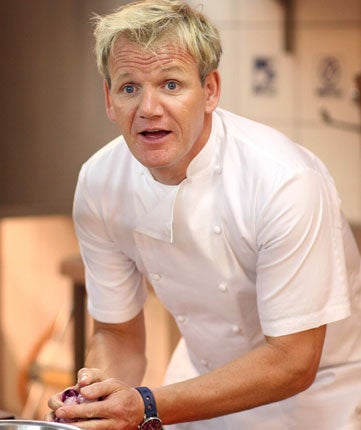Ramsay defends 'meals on wheels'
Chef under fire after revelation that gastro-pub food is prepared off-site

Gordon Ramsay maintained that the food in his gastro-pubs was fresh yesterday, despite admitting it was prepared in a backstreet kitchen in south London.
Staff in a Ramsay kitchen in Clapham prepared up to half the dishes for his three pubs in the capital – the Warrington in Maida Vale, the Narrow in Limehouse, the Devonshire in Chiswick – and for his Chelsea bistro, Foxtrot Oscar. Preparing food off-site for warming-up is common in mid-market restaurants but is less frequent in establishments run by Michelin-starred chefs.
Disclosure of the story in The Sun (headline: "Ramsay Serves Up Coq Au Van") is another dollop of bad news for the 42-year-old chef, following claims that he had a seven-year affair with a professional mistress (author of the book Having An Affair? A Handbook For The Other Woman), and the handing back of his hotel restaurants in Paris and Prague to their managements.
A manager at Foxtrot Oscar said to a reporter: "Everything is cooked here. It's Gordon Ramsay. It's very good."
What was not said was that dishes had been prepared by staff at GR Logistics which also supplies the catering trade. By the time they are served to Ramsay's diners they have a mark- up of up to 586 per cent; fishcakes sold to caterers for £1.92 a portion are priced at £9.99, while 75p sausage rolls are on the menu for £3.50.
Ramsay, who has 10 Michelin stars, more than any other British chef, has often spoken out against ready meals and praises fresh ingredients on his TV show Kitchen Nightmares.
A spokeswoman for his company, Gordon Ramsay Holdings, said prepping was "very common" in the restaurant business and insisted the food was fresh. "It's all sealed and delivered to the pubs and cooked freshly that day," she said. "So being cooked in one Gordon Ramsay premises and delivered to another is not going to make a difference." Two of the pubs, the Warrington and the Narrow, were in the top 10 pubs in the 2009 Michelin Guide, she added.
Richard Harden, co-editor of the Harden's Restaurant Guide, said he had no problem with food pre-prepared elsewhere, providing it was good. "Places which use prep kitchens are rarely of the top quality," he said. "Theoretically it works, but it doesn't in practice. As individual restaurants grow into groups, quality almost inevitably tails off."
At least two major high street chains use pre-prepared food, the pizza and pasta group Strada, which has 68 branches, and the 104-branch Café Rouge, which is styled on a traditional French restaurant. A spokeswoman for their owner, the Tragus Group, confirmed the practice to The Independent. "Yes, food is prepared to ensure consistent quality and freshness and then delivered to the restaurants," she said. "Obviously some food is prepared on site as well. It's a mixture and we don't break down what is [and isn't]."
Pizza Express makes two dishes in a central kitchen: lasagne and cannelloni. Its pizza dough is made in Oxfordshire and the tomato base for pizzas is tinned in Italy, a spokeswoman said.
Dan Thomas, news editor of Caterer and Hotelkeeper, pointed out that Ramsay's central kitchen had previously been owned by the chef Albert Roux. "There's a difference between a ready meal in Tesco and producing something to this standard," he said.
Dine out on these: Tricks of the restaurant trade
*Extra service charge (LEGAL)
A service charge of 10 or 12.5 per cent is automatically added to the bill. The waiter hands a credit card machine to the diner asking if they want to leave a tip, the implication being that one hasn't been added. "It used to be common, even in smart restaurants. My brother says it happened to him two weeks ago," said Richard Harden, co-editor of Harden's restaurant guides.
*Substituting cheaper ingredients (OFTEN ILLEGAL)
It may say steak on the menu, but it may not come from an ordinary cow. In 2007 laboratory analysis showed Greene King's Hungry Horse chain and JD Wetherspoon were legally selling "steak" from cows cross-bred with zebu, a humped cattle found in Brazil, which produces tougher meat. Last year the Food Standards Agency found 38 out of 380 fish in fish and chip bars and restaurants were mis-described, usually where cod had been replaced by haddock. The FSA suspects 10 per cent of food in the UK is mis-labelled.
*Passing off ordinary food as organic (ILLEGAL)
Restaurants and shops have been found to label conventional produce as "organic". In 2006, trading standards officers in Richmond, London, prosecuted two butchers for passing off conventional meat as organic.
*Using commercial sauces (LEGAL)
Béarnaise and blue cheese sauces advertised as "home-made" might come out of a jar. A kitchen's entire ingredients may be from the freezer. Small restaurants with large menus are most suspect. Chain restaurants are stuffed with pre-prepared food.
Subscribe to Independent Premium to bookmark this article
Want to bookmark your favourite articles and stories to read or reference later? Start your Independent Premium subscription today.

Join our commenting forum
Join thought-provoking conversations, follow other Independent readers and see their replies